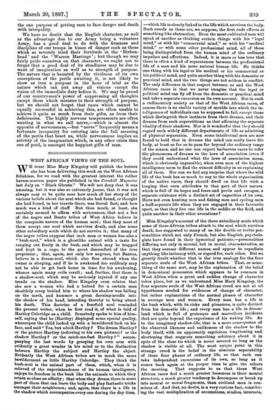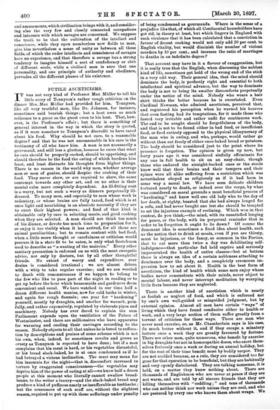WEST AFRICAN VIEWS OF THE SOUL.
WE trust Miss Mary Kingsley will publish the lecture she has been delivering this week on the West African fetishism, for we read with the greatest interest the rather harum-scarum paper she published in the Cornhill Magazine last July on " Black Ghosts." We will not deny that it was amusing, but it was also so extremely jocose, that it was not always easy to be quite sure how much of her story of the various beliefs about the soul which she had found, or thought she had found, in her travels there, was literal fact, and how much was a kind of chaff. But thus much, at least, she certainly seemed to affirm with seriousness, that not a few of the negro and Banta tribes of West Africa believe in the composite nature of the human soul ; that they most of them accept one soul which survives death, and also some other subsidiary souls which do not survive it; that many of the negro tribes suppose that each man or woman has also a " bush-soul," which is a ghostlike animal with a taste for ranging out freely in the bush, and which may be trapped and kept in a cage, to the great discomfort of the true proprietor ; that, again, not only low negroes, but Bantus, believe in a dream-soul, which also flies abroad when the owner is sleeping, and if he is awakened too suddenly may not be able to get back home in time for his awakening, whence again many evils result ; and, further, that there is a shadow-soul, which may be seriously injured if any one treads on the shadow. Miss Kingsley even relates that she saw a woman who had a hatred for a certain man stealthily creep behind him to where his shadow was falling on the earth, and hammer a great darning-needle into the shadow of his head, intending thereby to bring about his death. This doctrine of a fourfold soul reminded the present writer, when he first read it, of what is told of Hartley Coleridge as a child. Somebody spoke to him of him- self, saying that he (Hartley) displayed some special quality, whereupon the child looked up with a bewildered look on his face, and said " Yes, but which Hartley P The dream Hartley? or the picture Hartley (referring to his own picture) ? or the shadow Hartley P or the catch-me-fast Hartley ? " accom-
panying the last words by grasping his own arm with evidently a great wonder in his mind as to the distinction between Hartley the subject and Hartley the object. Evidently the West African tribes are in much the same bewilderment as little Hartley Coleridge. They think the bush-soul is the animal part of them, which, when it is relieved of the superintendence of its human intelligence, enjoys its freedom in the bush like the animals to which they retain so close an affinity ; that when they dream there is some part of them that can leave the body and play fantastic tricks amongst their neighbours; and, again, that there is a life in the shadow which accompanies every one during the day time, —which life is closely linked to the life which survives the body. Such creeds as these are, we suppose, the first rude efforts at something like abstraction. Even the most cultivated men will speak of another as thinking certain things with his " legal mind," or with his " commercial mind," or with his " medical mind," or with some other professional mind, all of these being distinguished from the human mind of the ordinary impulses and affections. Indeed, it is more or less true that there is often a kind of separateness between the professional life of a man and his more natural human life. He thinks one thing with his legal or his medical or his commercial or his political mind, and quite another thing with his domestic or practical mind, and the two things are not seldom in conflict. The only difference in that respect between us and the West African races is that we never imagine that the legal or political mind can fly off from the domestic or practical mind and take a separate excursion on its own account. But in such a rudimentary society as that of the West African races, of course there is no visible variety of moulds into which the in- telligences of individuals can be supposed to fall, except those which distinguish their instincts from their dreams, and their dreams from such superstitions as that affirming the separate vitality of their shadows. Nor is it wonderful that they should regard such widely different departments of life as admitting of physical separation. Even some intellectual men are now found to hold that in dreams the mind can really leave the body, at least so far as to pass far beyond the ordinary range of the senses, and no one can expect barbarous races to refer the phenomena of dreams to the laws of association (even if they could understand what the laws of association mean, which is obviously impossible), when even men of the highest intelligence seem to find the utmost difficulty in so explaining all of them. Nor can we feel any surprise that where the wild life of the bush has so much to say to the whole organisation of the native races, they should dwell on that life with a longing that even attributes to that part of their nature which is full of its hopes and fears and perils and escapes, a separate existence with a distinct set of capacities of its own. Have not even hunting men and fishing men and cycling men a half-separate life when they are engaged in their favourite sport, so that they live one life in the saddle or the field, and quite another in their other avocations P Miss Kingsley's account of the three subsidiary souls which some of these African tribes attach to the soul which survives death, has suggested to many of us the double or treble per. sonalities which not only French, but also English, psycholo- gists have found in their hysterical patients,—personalities differing not only in mental, but in moral, characteristics, so that they assume different names, and appear to repudiate anything like intimacy with, or regard for, each other. But we greatly doubt whether that is the true analogy for the four separate souls of the West African tribes. That, or some- thing of the same sort, may be the explanation of the belief in demoniacal possession which appears to be common in West Africa when a great and sudden change of character takes place, but as we understand Miss Mary Kingsley, the four separate souls of the West African creed are not at all hypotheses needed for evidences of change of character, but rather explanations of the normal phases of character in average men and women. Every man has a life in the bush which, with its risks and pleasures, is quite distinct from his domestic life ; and every man has a life in dream- land which is full of grotesque and marvellous incidents that are quite beyond the experience of his waking life. As to the imaginary shadow-life, that is a mere consequence of the observed likeness and unlikeness of the shadow to the body itself, with its apparently capricious lengthening and i
shortening that suggests something arbitrary about it in spite of the close tie which is never severed so long as the shadow is visible at all. The most unique point in this strange creed is the belief in the absolute separability of these four phases of ordinary life, so that each can take independent excursions of its own, so long as it comes back again at the proper time to give the others the meeting. That suggests to us that these West African races feel a much greater looseness in their mental structure, a much greater tendency to decompose or break up into mental or moral fragments, than civilised man is con- scious of. And that, no doubt, is a very curious fact, consider- ing the vast multiplication of occupations, studies, interests,
and amusements, which civilisation brings with it, and consider- ing also the very few and closely connected occupations and interests with which savages are concerned. We suppose the truth to be that the cultivation of the intellect and conscience, while they open numberless new fields to man, give him nevertheless a sense of unity as between all these fields, of which the ruder intellects and consciences of savages have no experience, and that therefore a savage has a strong tendency to imagine himself a sort of confederacy or club of different souls, while a civilised man is sure that one personality, and one principle of authority and obedience, pervades all the different phases of his existence.







































 Previous page
Previous page